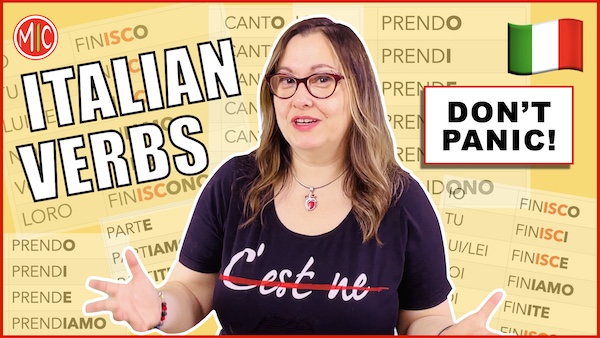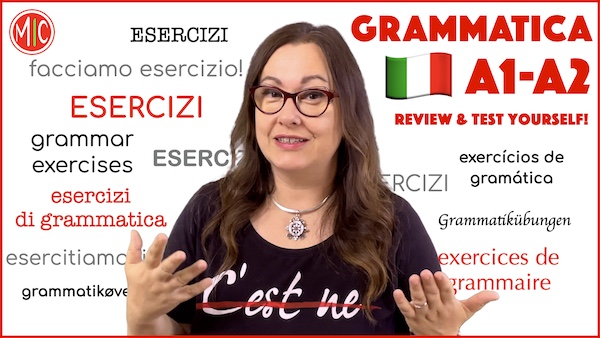Italian Grammar Lessons
Learn Italian properly by understanding the main concepts of Italian grammar with our free video lessons. Most topics are explained in English and exemplified using plenty of authentic sentences, while some of the more advanced concepts are explained in Italian. We also help you make sense of tricky grammar topics on our blog.
Can you learn Italian by ear, using Duolingo, watching TV or listening to music... without ever opening a grammar handbook? Sorry, we don't think so. We believe that adults learners need to know the how's and why's. Italian is a heavily inflected language: nouns, articles and adjectives have a grammatical gender, verbs are conjugated in many moods and tenses, and parts of speech must agree with each other. It would take a long time to figure out all the rules by trial and error. A clear explanation and a few exercises will allow you to understand each concept more quickly and will make life much easier for you!
Italian Grammar Topics:
- Basic Italian Grammar Topics: Nouns, Articles, Adjectives, Pronouns & Prepositions
- How to Conjugate Italian Verbs: Verb Moods & Tenses
- Master the Most Common Irregular Verbs in Italian
- Let's Practise! Esercizi per il tuo italiano
- Intermediate & Advanced Italian Grammar Topics
How to Learn Italian Effectively
- Set specific goals and a realistic schedule. If you have a busy life, just try to fit 10 or 15 minutes of Italian into your daily routine.
- Don't rush! Study each lesson thoroughly and watch a video multiple times. Review old lessons every now and then, and focus on your weak spots.
- Put into practice! Passive learning is not enough. Targeted exercises will help you understand and remember what you just learned.
- Delve deeper. You can download the transcript of each video to review and repeat from just $1 a month. Upper-tier patrons get a special PDF with additional exercises. Some videos have a free transcript!
If you find our videos useful, SUBSCRIBE to our YouTube channel - it's free! Write comments on YouTube and get in touch if you have questions.
Download our free Italian Grammar Basics PDF.

We just updated and expanded our grammar handbook! Get it from Amazon.

Basic Italian Grammar Topics

Nouns, articles, adjectives, pronouns, and prepositions: master the parts of speech in Italian. We begin with the gender of nouns - in Italian all nouns are either masculine or feminine! - and we expand on the concept of agreement between nouns, articles and adjectives. We also tackle prepositions and pronouns, tricky topics that require special attention. Take your time and don't skip the exercises! Practice makes progress.
Verb Conjugation - Verb Moods & Tenses in Italian

Italian verbs convey a lot of information on when the action happens and on the subject that performs it; sometimes a different vowel at the end is enough to change mood, tense and person! If your first language has little or no inflection, like English or Chinese, you will have to understand the concept of verb conjugation first; then try to memorise conjugations by repeating whole sentences. Most of the following lessons include plenty of exercises to help you make sense of the various moods and tenses.
Master the Most Common Irregular Verbs in Italian

Like in English, many of the most common Italian verbs are irregular. Once you know the basics of verb conjugation, watch this series on Italian verbs, where we provide tips to remember irregular conjugations and we explain uses, synonyms and idiomatic expressions with plenty of examples.
When to use ANDARE, and when to use VENIRE? What is the difference between SAPERE and CONOSCERE? Why is coscienza spelled with an "i" and conoscenza without? Tra il DIRE e il FARE c'è di mezzo il mare, ed è tutto un ANDIRIVIENI! Let's learn all of this together.
| Free Video Lesson | Free/$1 Tier | Upper Tiers | |
|---|---|---|---|
| ANDARE - How to say I go in Italian | A1 | Free Transcript | |
| VENIRE - How to say I come in Italian | A1 | Free Transcript | Special PDF |
| FARE - How to say I do in Italian | A1 | Free Transcript | Special PDF |
| DIRE - How to use say in Italian | A1 | Free Transcript | Special PDF |
| SAPERE - How to say I know in Italian | A1 | Free Transcript | Special PDF |
| VOLERE - How to say I want in Italian | A1 | Free Transcript | Special PDF |
| POTERE - How to say I can in Italian | A1 | Transcript | Special PDF |
Let's Practise! Esercizi di grammatica italiana

The following videos include a mix of exercises on various topics, and will help you avoid the most common mistakes. You will also find exercises in most of our grammar lessons, and there are practice videos linked to some of the most important topics listed above. Practice is key! Forza!
| Free Video Lesson | $1 Tier | Upper Tiers | |
|---|---|---|---|
| Esercizi di grammatica di base - A mix of basic grammar exercises | A1-A2 | Special PDF | |
| Giusto o sbagliato? - Common Mistakes in Italian | A1-A2 | Transcript | Special PDF |
| Four Common Mistakes in Italian - More mistakes to fix | A1-A2 | Transcript | Special PDF |
| Grammar Mix for the Holidays | A1-B2 | Transcript | Special PDF |
More Intermediate Grammar Topics

Ready to take your Italian to the next level? Qui troverai pane per i tuoi denti. The particles CI and NE are considered a thorny topic, but they are widely used in everyday Italian and should be learned sooner rather than later. Then, if you are already familiar with the subjunctive and the conditional moods, you can tackle conditional sentences - il periodo ipotetico.
| Free Video Lesson | Free/$1 Tier | Upper Tiers | |
|---|---|---|---|
| The Particles CI & NE - Italian Clitics | B1 | Free Transcript | Special PDF |
| The Relative Pronouns CUI & IL QUALE | B1 | Transcript | Special PDF |
| La forma passiva - The Passive Voice | B1 | Transcript | Special PDF |
| Il periodo ipotetico della realtà - Conditional Sentences 1 | B2 | Transcript | Special PDF |
| Il periodo ipotetico della possibilità - Conditional Sentences 2 | B2 | Transcript | Special PDF |
| Il periodo ipotetico dell'irrealtà - Conditional Sentences 3 | B2 | Transcript | Special PDF |

